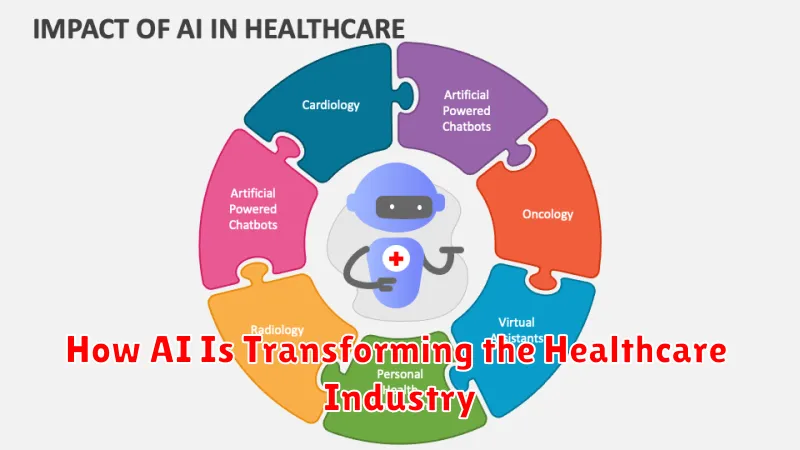The healthcare industry is undergoing a dramatic transformation fueled by the rapid advancement and integration of artificial intelligence (AI). From diagnostics and treatment planning to drug discovery and patient care, AI is revolutionizing nearly every facet of the healthcare ecosystem. This powerful technology is enhancing efficiency, improving accuracy, and personalizing the patient experience, promising to address some of the most pressing challenges facing healthcare systems globally. This article will explore the multifaceted ways in which AI is reshaping the healthcare landscape and the potential it holds for the future of medicine.
AI-powered tools and applications are proving invaluable in improving diagnostics, streamlining administrative tasks, accelerating drug development, and enabling personalized medicine. By leveraging the power of machine learning, deep learning, and natural language processing, AI is driving innovation and paving the way for more precise, efficient, and patient-centered healthcare delivery. Read on to discover the key areas where AI is making the most significant impact and how it is poised to redefine the healthcare industry as we know it.
AI in Diagnostics and Imaging
Artificial intelligence is rapidly transforming diagnostic medicine and medical imaging. AI algorithms can analyze medical images, such as X-rays, CT scans, and MRIs, to detect subtle patterns that may be missed by the human eye. This can lead to earlier and more accurate diagnoses of a wide range of conditions, from cancers to cardiovascular diseases.
AI can also automate time-consuming tasks, such as measuring tumor size or identifying areas of concern, freeing up radiologists and other healthcare professionals to focus on more complex cases and patient care. The increased efficiency and accuracy provided by AI promises to improve patient outcomes and reduce healthcare costs.
Predictive Analytics for Patient Care
Predictive analytics leverages the power of data, statistical algorithms, and machine learning to forecast future outcomes related to patient health. This allows for proactive interventions, enhancing the quality of care provided.
By analyzing historical patient data, including medical history, diagnoses, treatments, and socioeconomic factors, predictive models can identify individuals at high risk of developing specific conditions, such as diabetes, heart disease, or even hospital readmissions. This information empowers healthcare providers to implement preventative measures and personalized treatment plans.
For instance, a predictive model might identify a patient with a high probability of developing heart failure. This allows physicians to intervene early, perhaps by prescribing lifestyle changes or medications, potentially preventing or delaying the onset of the condition and improving the patient’s overall health outcome. This data-driven approach optimizes resource allocation and improves patient outcomes.
AI-Powered Drug Discovery

Artificial intelligence is revolutionizing drug discovery, significantly reducing the time and cost associated with developing new medications. Traditionally, this process has been laborious, involving extensive trial and error. AI algorithms can analyze vast datasets of molecular information, identifying promising drug candidates much faster than traditional methods.
This accelerated process holds immense potential for treating a wide range of diseases. By predicting the efficacy and safety of potential drugs, AI minimizes the risk of costly failures in later stages of development. This efficiency translates to faster access to life-saving medications for patients.
Furthermore, AI facilitates the development of personalized medicine, tailoring treatments to individual genetic profiles. This targeted approach enhances treatment effectiveness and minimizes adverse reactions, paving the way for a more precise and effective healthcare system.
Robot-Assisted Surgery
Robot-assisted surgery, a remarkable advancement in surgical procedures, leverages robotic systems to aid surgeons. These systems enhance precision, dexterity, and control, allowing for minimally invasive techniques.
Key benefits include smaller incisions, reduced blood loss, less pain, and faster recovery times for patients. For surgeons, robotic systems offer enhanced visualization through 3D imaging and improved ergonomics.
While currently used in various specialties like urology, gynecology, and cardiac surgery, the potential for robotic surgery extends across a wider range of procedures in the future, driven by ongoing technological advancements.
Natural Language Processing in Medical Records
Natural Language Processing (NLP) plays a crucial role in analyzing the vast amount of unstructured data present in medical records. NLP algorithms can extract key information from clinical notes, physician reports, and patient histories.
This information can then be used to improve patient care, streamline administrative tasks, and support medical research. For example, NLP can identify patients at risk of developing specific conditions, track the progression of diseases, and assist in clinical decision support.
By automating the process of extracting information from text, NLP helps healthcare professionals save time and focus on providing the best possible care to their patients.
Challenges and Ethical Considerations
While AI offers immense potential, its implementation in healthcare faces significant hurdles. Data privacy and security are paramount, demanding robust safeguards against breaches and misuse of sensitive patient information.
Algorithmic bias, often reflecting existing societal biases, poses a risk of unequal access to care and inaccurate diagnoses. Ensuring fairness and equity in AI systems is crucial.
The need for clear regulatory frameworks and ethical guidelines for AI development and deployment is also critical. Determining liability in cases of misdiagnosis or adverse events related to AI remains a complex challenge.
Future of AI in Personalized Medicine
The future of AI in personalized medicine holds immense potential. AI algorithms can analyze vast amounts of patient data, including genomics, lifestyle, and environmental factors, to predict individual responses to treatments. This allows for the development of targeted therapies and precise drug dosing, maximizing efficacy and minimizing adverse effects.
Early disease prediction is another key area. AI can identify subtle patterns and markers indicative of disease onset, enabling proactive interventions and potentially preventing disease progression. This will shift healthcare from reactive to preventative, leading to improved patient outcomes and reduced healthcare costs.

